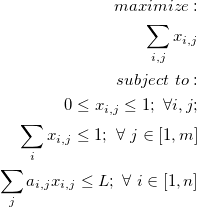I am trying to solve the following linear problem by using the Simplex solver from apache-commons: org.apache.commons.math3.optim.linear.SimplexSolver.
n is the number of rows
m is the number of columns
L is a global limit for the sum value of each row
This is what I have so far:
List<LinearConstraint> constraints = new ArrayList<>();
double[][] A = calculateAValues();
// m = count of columns
// constraint 1: the sum of values in all column must be <= 1
for(int i = 0; i < m; i++) {
double[] v = new double[n];
for(int j=0; j < n; j++) {
v[j] = 1;
}
constraints.add(new LinearConstraint(v, Relationship.LEQ, 1));
}
// n = count of rows
// constraint 2: sum of a_i,j in all row must be <= L (Limit)
for(int i = 0; i < n; i++) {
double[] v = new double[m];
for(int j=0; j < m; j++) {
v[j] = A[i][j];
}
constraints.add(new LinearConstraint(v, Relationship.LEQ, L));
}
double[] objectiveCoefficients = new double[n * m];
for(int i = 0; i < n * m; ++i) {
objectiveCoefficients[i] = 1;
}
LinearObjectiveFunction objective = new LinearObjectiveFunction(objectiveCoefficients, 0);
LinearConstraintSet constraintSet = new LinearConstraintSet(constraints);
SimplexSolver solver = new SimplexSolver();
PointValuePair solution = solver.optimize(objective, constraintSet, GoalType.MAXIMIZE);
return solution.getValue();
I have trouble getting the objective function right, and also it might be some other things missing. My every attempt so far resulted in UnboundedSolutionException.

